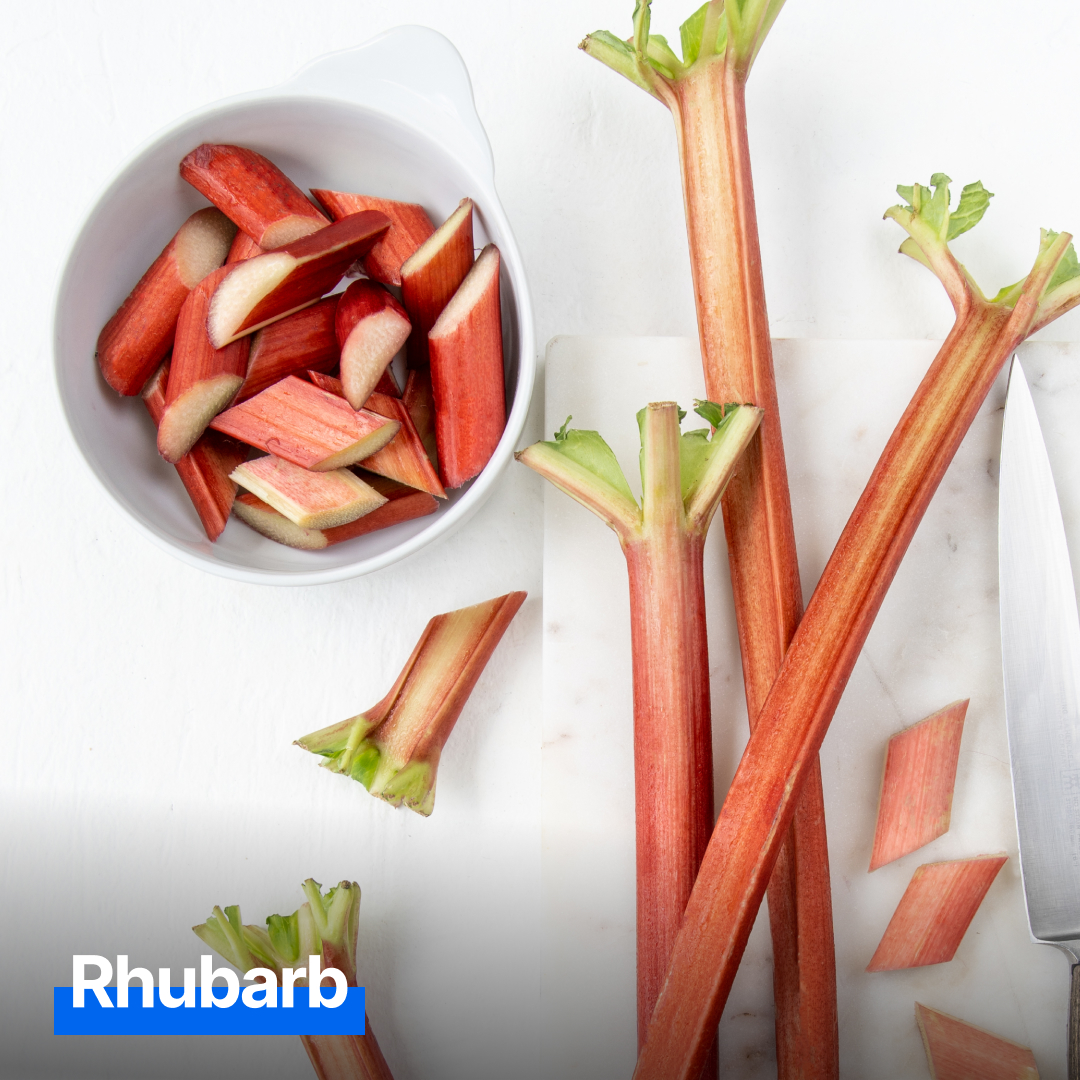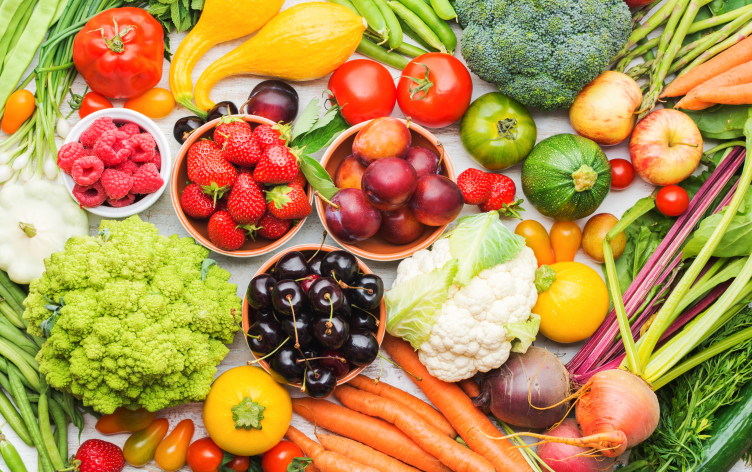We all know the importance of eating fresh produce. It’s often suggested (and backed up by theUSDA), that fruits and vegetables should take up half of our plate, with grains, protein and dairy accounting for the other 50%. That’s a worthwhile goal and one that’s made easier when equipped with ideas to keep meals interesting. Fortunately, there are countless opportunities to infuse your diet with seasonal fruits and vegetables, from hearty salads to cooked sides and plant-focused entrees.
During the spring, certain fruits and vegetables hit their peak in freshness and flavor, so the next time you head to the grocery store or farmers market, fill your basket with these 10 items recommended by sports dietitian and nutrition expert,Leslie Bonci, RD.
SPRING FRUITS

Fresh pineapples have a sweet, tart taste that can improve multiple dishes, from smoothies and salads to kebabs. The tasty fruit is full of vitamin C, manganese, copper, B vitamins and fiber.
Ripe pineapples should have a sweet, tropical aroma near the stem. Look for fruit that is firm but gives a little in your hands when squeezed.
Nutrition: 1 cup raw pineapple has 78 calories and 20 grams of carbs.

This seasonal favorite is full of vitamin C, fiber, potassium, antioxidants and flavonoids. The versatile fruit is great added to cereal, oatmeal and salads, and you can use either fresh or frozen berries in smoothies.
Select strawberries with bright red flesh and bright green tops. If you notice any white spots, that’s usually an indication that the fruit was picked before it was ready.
Nutrition: 1 cup of fresh strawberries has 47 calories, 11 grams of carbs and 1 gram of protein.

Lemons contain vitamin C and soluble fiber, and the tart citrus fruit adds freshness and depth of flavor to everything it touches. Squeeze fresh lemon on fish and pasta or add some to your water.
Choose lemons that are firm, smooth and unblemished. Lemons that show tinges of green are likely underripe.
Nutrition: 1 medium-size fresh lemon has 22 calories and 6 grams of carbs.

This household staple contains potassium, vitamin B6, folate and fiber. Add a banana to your next smoothie, or slice one and add oatmeal, cereal and peanut butter toast.
Choose bananas with smooth, brightly colored skin and no visible bruising. If you want to eat it quickly, pick one that’s yellow. If you won’t eat it for several days, opt for one that’s still green.
Nutrition: 1 medium-sized banana has 105 calories, 25 grams of carbs and 1 gram of protein.

OK, rhubarb is technically a vegetable, but it’s used more like a fruit, hence its placement here. Bonci says rhubarb contains dietary nitrates, anthocyanins and fiber, and its tart taste compliments the sweetness of pineapple and berries. Stewed rhubarb makes delicious desserts.
挑选新鲜的大黄茎酥和公司,but with some give. Skip anything that seems woody or wilted. Remember, the leaves are toxic, so be sure those are removed before cooking.
Nutrition: 1 cup of raw rhubarb has 25 calories, 5 grams of carbs and 1 gram of protein.
SPRING VEGETABLES

Bonci likes peas whether fresh, canned or frozen, and says they provide a sweet kick to dishes, along with plenty of magnesium, potassium and polyphenols, plus a surprising dose of protein. She suggests eating them alone, pureed in a soup, or paired with other veggies in a medley or stir-fry.
Frozen peas are packed right after they’re harvested, so don’t hesitate to stash a couple of bags in your freezer. But if you want fresh peas, buy them in their pods, checking to ensure they’re firm, crisp and bright green.
Nutrition: 1 cup of fresh peas has 118 calories, 20 grams of carbs and 8 grams of protein.

Asparagus is high in fiber, folate and vitamin K. Roast the versatile vegetable in the oven or a pan with some olive oil, salt and pepper, and you have a quick side dish to complement meat or fish. You can also add it to omelets, pastas and stir-fries.
Pick stalks that are bright green, crisp and firm, with tightly closed tips.
Nutrition: 1 cup of raw asparagus has 27 calories, 5 grams of carbs and 3 grams of protein.

Spinach is low in calories and packed with vitamins A, C and K, as well as folic acid, potassium and zeaxanthin, a carotenoid that is good for the eyes. Make a quick spinach salad for an easy win, or follow Bonci’s lead and incorporate spinach into omelets and pasta.
Choose spinach that is dark green and fresh, with no signs of yellowing or wilting.
Nutrition: 1 cup of raw spinach has 6 calories and 1 gram of carbs.

This crunchy vegetable is accessible, inexpensive and loaded with nutrients, including beta carotene, fiber and potassium. Orange carrots are great, but you can also find yellow, purple and white varieties. Roast carrots in the oven, add them to soups, stews and salads, or eat them raw with hummus or your favorite dip.
Fresh carrots should be plump and firm, with a bright orange color and no visible cracks.
Nutrition: 1 cup of raw carrots has 52 calories, 12 grams of carbs and 1 gram of protein.

There are more mushroom varieties than you can count, so try a few types to find your favorites. Mushrooms are high in fiber, B vitamins and potassium, with certain types also including a healthy dose of vitamin D and other substances that support a healthy immune system, says Bonci. She adds that they provide umami to dishes, and you can bulk up meat dishes (or reduce your meat consumption) by blending chopped mushrooms with meat. For starters, make your next burger with half ground beef and half mushrooms for an option with fewer calories and less fat.
Choose mushrooms that are firm, smooth and dry. Avoid mushrooms that have a slimy or filmy coating.
Nutrition: 1 cup of raw white mushrooms has 15 calories, 2 grams of carbs and 2 grams of protein.
THE BOTTOM LINE
Each season is a new opportunity to eat a variety of fruits and vegetables. Certain produce hits its peak during the spring, so fill your shopping cart and then your plate with options like pineapple, rhubarb, peas and asparagus. Trying new foods, whether raw or cooked, is a great way to keep your meals interesting and ensure you meet your daily nutrition needs.
Ready to take the next step?Unlock MyFitnessPal Premiumto access custom goal settings, quick-log recipes, and guided plans from a registered dietitian. Premium users are 65% more likely to reach their weight loss goals!

